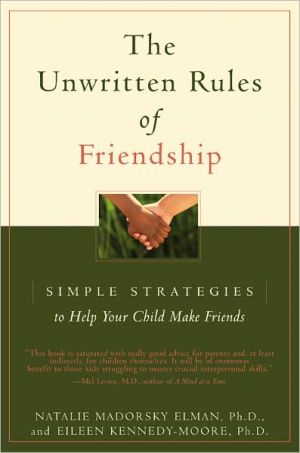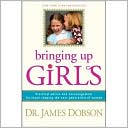Unwritten Rules of Friendship: Simple Strategies to Help Your Child Make Friends
This practical and compassionate handbook helps parents sharpen any child's social skills by identifying the "unwritten rules" that govern all relationships.
Search in google:
This practical and compassionate handbook helps parents sharpen any child's social skills by identifying the "unwritten rules" that govern all relationships. Publishers Weekly Elman, director of the Summit Center for Learning in Summit, N.J., and Kennedy-Moore, a Westfield, N.J., psychotherapist, offer a detailed examination of the different ways children interact with their peers. Often, otherwise bright and "normal" children behave in ways that cause other children, family members and teachers to label them as disruptive, unhappy or troublesome. There are nine types of children, according to the authors, including the "short-fused," "little adult," "born leader" and "different drummer." Parents will immediately be able to identify their child from the detailed descriptions included. For example, "Short-Fused Children may appear to be strong, but inside they feel vulnerable. These children are extremely sensitive. They often believe that the whole world is against them. Because they feel threatened, they respond angrily, instinctively fighting to protect themselves." As they explain the various types of behaviors, the authors depict a number of scenarios to show the difficulties children can have relating to others. The challenge for the parents is to help their children learn "the Unwritten Rules" so they have fewer problems and form happier, more productive relationships. The authors provide specific sentences that both parents and children can use to change these destructive behavior patterns, but some parents will probably hope for even more specific do's and don'ts. Given that other childrearing tomes rarely cover this topic, this book is a welcome addition to the parenting library. (Sept.) Copyright 2003 Reed Business Information.
PrefaceixChapter 1The Unwritten Rules of Friendship: Simple Strategies Every Child Needs to Know3Chapter 2The Vulnerable Child15Allen: Giving In to ThreatsPhillip: Asking for TroubleChapter 3The Intimidating Child48Jason: Believing "Might Makes Right"Dolores: Excluding Another ChildJennifer: Bullying a SiblingChapter 4The Different Drummer73Eric: Seeking Negative AttentionSpencer: Talking Up a StormChelsea: Coming On Too StrongChapter 5The Shy Child108Michael: Not Knowing What to SayEmma: Hiding from the GroupChapter 6The Short-Fused Child137Gregory: Acting Like a Poor SportLorena: Assuming Malicious IntentMalcolm: Falling Apart in PublicChapter 7The Little Adult179Margaret: Playing "the Expert"Simon: Belittling Peers' InterestsNathan: Needing to Be PerfectChapter 8The Sensitive Soul208Jonathan: Overresponding to TeasingClaudia: Overreacting to CriticismLauren: Holding On to GrudgesChapter 9The Born Leader234Samantha: Running the ShowJack: Acting Like the Rule PoliceFrancine: Arguing with Authority FiguresChapter 10The Pessimistic Child271Meredith: Constantly ComplainingNadia: Feeling ShortchangedZack: Expecting the WorstChapter 11Frequently Asked Questions302AppendixList of Activities311Recommended Reading for Parents317Selected Professional References321Acknowledgments325Index329About the Authors339
\ Publishers WeeklyElman, director of the Summit Center for Learning in Summit, N.J., and Kennedy-Moore, a Westfield, N.J., psychotherapist, offer a detailed examination of the different ways children interact with their peers. Often, otherwise bright and "normal" children behave in ways that cause other children, family members and teachers to label them as disruptive, unhappy or troublesome. There are nine types of children, according to the authors, including the "short-fused," "little adult," "born leader" and "different drummer." Parents will immediately be able to identify their child from the detailed descriptions included. For example, "Short-Fused Children may appear to be strong, but inside they feel vulnerable. These children are extremely sensitive. They often believe that the whole world is against them. Because they feel threatened, they respond angrily, instinctively fighting to protect themselves." As they explain the various types of behaviors, the authors depict a number of scenarios to show the difficulties children can have relating to others. The challenge for the parents is to help their children learn "the Unwritten Rules" so they have fewer problems and form happier, more productive relationships. The authors provide specific sentences that both parents and children can use to change these destructive behavior patterns, but some parents will probably hope for even more specific do's and don'ts. Given that other childrearing tomes rarely cover this topic, this book is a welcome addition to the parenting library. (Sept.) Copyright 2003 Reed Business Information.\ \ \ \ \ Library JournalThe world of the child is both a preparation for adulthood and a total society of its own, and these books map it from quite different perspectives. Sociologist Corsaro (The Sociology of Childhood) provides a comparative description of preschool education in the United States and Italy, using participant-observation methodology in economically diverse settings. His research, which began in the 1970s (Berkeley, CA) and concluded in 2001 (Modena, Italy), focuses on children's friendship processes. Topics include conflict, types of play, adult role rehearsal, and sharing and social participation. Interestingly, he concludes that the Italian preschool system, which is more fully integrated into the larger society, generated a richer and more complex peer culture. Ways to improve the U.S. version are also discussed. The Unwritten Rules of Friendship is a more direct advisory manual for parents concerned about their children "fitting in" with peers. Elman (director, Summit Ctr. for Learning, NJ) and Kennedy-Moore (Expressing Emotion: Myths, Realities, and Therapeutic Strategies) rely on research and clinical experience to formulate nine prototypes of children with friendship problems. These range from passive (e.g., "sensitive soul") to more aggressive (e.g., "intimidating" children, "short-fused" children, and born leaders) personalities. Chapters provide checklists for evaluation, social rules such children need to know, learning activities, and case studies. Corsaro's book contains unique and valuable policy insights into early education issues, though the research covers an unusually lengthy time span; recommended for academic and specialized early childhood education collections. Colorfully written and practical, Unwritten Rules offers many tips for anxious parents. Whereas similar books limit their perspective to the bully/victim paradigm, this one covers more diverse personality problems in a somewhat cursory but productive way. Recommended for public library parenting collections.-Antoinette Brinkman, Evansville, IN Copyright 2003 Reed Business Information.\ \








